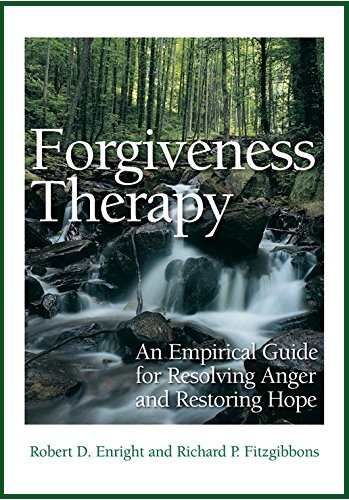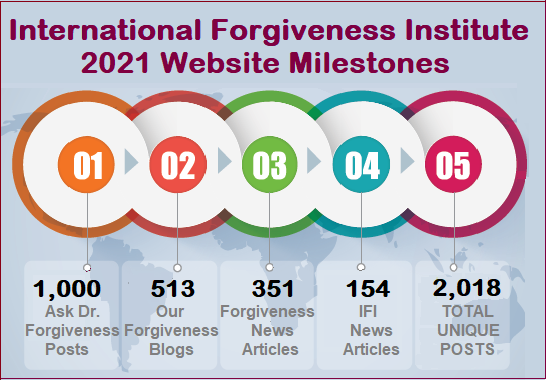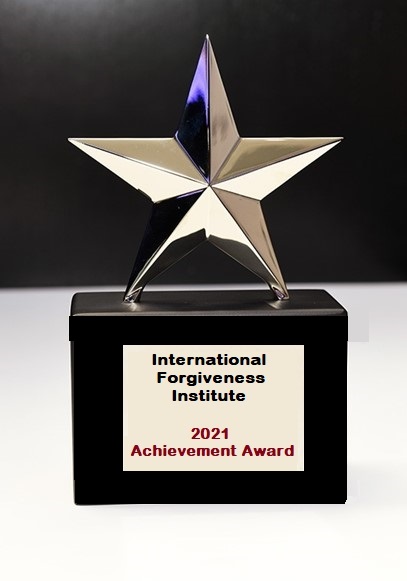Tagged: “forgiveness therapy”
Forgiveness Interventions Help Depressed Adolescents Cope and Thrive
Ample research has shown that depression is a significant and growing problem for today’s adolescents. Depression can impair a teenager’s cognitive functioning (i.e., thinking, reasoning, etc.), relationships with parents and peers, academic performance, and for cases of severe depression may even result in suicide attempts. Moreover, adolescent depression is also associated with poor outcomes in adulthood such as low-income levels, low educational aspirations, and high substance use.
Now, two international education and forgiveness specialists believe they may have uncovered one of the keys to reducing adolescent depression and major depressive disorder (MDD). According to the researchers, their first-of-its-kind study has shown that promoting social skills such as responsibility and self-control could be “particularly salient for the prevention of adolescent depression.”
The new study, A Longitudinal Analysis of Social Skills and Adolescent Depression: A Multivariate Latent Growth Approach, was published in the current issue of the International Journal of Psychological Research (the official publication of the Faculty of Psychology at San Buenaventura University in Medellin, Colombia.). The study authors included Dr. Zhuojun Yao, an educational psychologist and lecturer at Soochow (Suzhou) University in Suzhou, China, and Dr. Robert Enright, of our International Forgiveness Institute.
BACKGROUND: Adolescence is a period of increased vulnerability to depression because of complex changes in biology, cognition, and social domains. According to the 2019 National Survey on Drug Use and Health (NSDUH), 3.5 million adolescents aged 12 to 17 in the United States (14.4% of the total) had at least one Major Depressive Episode (MDE), and 70% of these adolescents had an MDE with severe impairment in 2018.
Most clinical depression among children starts in middle adolescence (ages 15-18) and is much higher for those in that age group than for those in early adolescence (ages 13-15). Although there are substantial empirical research studies demonstrating the association between social skills and adolescent depression, the authors of this study could not locate a single scientific work investigating how the change in social skills influences the change in depression from early to middle adolescence.
THE STUDY: To address this gap in fundamental knowledge, the researchers in this study questioned how changes in social skills (cooperation, assertion, responsibility, and self-control) influence changes in depression from early to middle adolescence. Using internationally respected measurement tools, the authors measured both social skills and depression in 1,064 participants (half boys, half girls). Those participants were drawn from a separate longevity study by the National Institute of Child Health and Human Development Study of Early Child Care and Youth Development (NICHD SECCYD) that ran from 1991 through 2008.
STUDY RESULTS: According to the study authors, adolescents who had more increase in responsibility and self-control from 5th grade to 9th grade tended to experience a slower increase in depression; while adolescents who had more reduction in cooperation and assertion from 5th grade to 9th grade tended to experience a faster increase in depression. Overall, the results suggest that responsibility in early adolescence may decrease adolescent depression by protecting adolescents from risk-taking and problematic behaviors in middle adolescence.
“When used in association with other therapeutic modalities. . .the psychotherapeutic
use of forgiveness can resolve the anger associated with depressive disorders.”
Dr. Robert Enright
IMPLICATIONS FOR FORGIVENESS: Interventions to reduce adolescent depression are becoming more important with each passing day because, as outlined above, adolescent depression also is associated with poor outcomes in adulthood. A 2009 study revealed that at least 27 million Americans take antidepressants, nearly double the number (13.3 million) who did so in the mid-1990s (Olfson & Marcus, 2009). Less understood is the fact that approximately 80% of adult mental disorders begin during childhood and adolescence (Kim-Cohen et al., 2003) and typically include an intense emotional state of anger.
 “Anger begins in early childhood and later extends to relationships with significant others, particularly those one wants to trust,” Dr. Enright writes in Forgiveness Therapy, the widely-heralded forgiveness intervention manual he authored with psychiatrist Dr. Richard Fitzgibbons. “Anger from childhood hurts and disappointments with parents and others can be unresolved and later misdirected unconsciously at others. [page 108]
“Anger begins in early childhood and later extends to relationships with significant others, particularly those one wants to trust,” Dr. Enright writes in Forgiveness Therapy, the widely-heralded forgiveness intervention manual he authored with psychiatrist Dr. Richard Fitzgibbons. “Anger from childhood hurts and disappointments with parents and others can be unresolved and later misdirected unconsciously at others. [page 108]
“Once anger develops, three options are available for addressing this powerful and complex emotion: denial, expression (active or passive-aggressive), and forgiveness. If the anger is resolved through a forgiveness process, it can facilitate the healing of the associated sadness, depression and the tendency to ruminate over past hurts.” [page 108]
According to Dr. Enright, “This study provides yet another compelling reason why we need Forgiveness Education in our schools NOW.”
This study on adolescent depression is just one of the many research projects undertaken by Drs. Zhuojun Yao and Robert Enright. Others include:
- The influence of moral stories on kindergarteners’ sharing behavior
- The role of consequences of moral action in maximizing moral elevation
- Belief in altruistic human nature and prosocial behavior: a serial mediation analysis
- The Link Between Social Interaction with Adults and Adolescent Conflict Coping Strategy in School Context
I heard that you recently published a study with your colleagues in which you helped men in prison learn to forgive. What did you find and why did you focus on prisoners who, it seems to me, need to ask us for forgiveness because of what they did?
Rehabilitation in correctional institutions tends to focus on changing the behavior which led to the sentencing in the first place. Yet, our research found that about 90% of 103 men whom we surveyed had considerable injustices against them when they were children or adolescents. One gentleman was thrown out of his home by his mother when he was 10 years old. He slept under cars at night as his bed. So often, this kind of cruelty against children can lead to a welling up of hatred and this can lead to crime, arrest, and imprisonment. Forgiveness Therapy allowed the men to forgive those who abused them which led to a statistically significant decrease in clinical levels of anger, anxiety, and depression to normal or near normal levels. They also developed more empathy toward people in general. Those in the control group, without Forgiveness Therapy, did not show this kind of improvement in their mental health, but when they then were given Forgiveness Therapy, they, too, showed similar improvement compared with the original experimental group. Here is the reference to that research:
Yu, L., Gambaro, M., Song, J., Teslik, M., Song, M., Komoski, M.C., Wollner, B., & Enright, R.D. (2021). Forgiveness therapy in a maximum-security correctional institution: A randomized clinical trial. Clinical Psychology and Psychotherapy.
“The World’s Largest Portal to Anything and Everything Forgiveness-Related”
“Ask Dr. Forgiveness” is a dedicated column on the IFI website where users can ask questions related to even the toughest forgiveness topics and receive an informed response directly from IFI co-founder Dr. Robert Enright who is often referred to as “Dr. Forgiveness.” It is the IFI’s most popular website component and has garnered questions from individuals across the globe who are seeking answers and information on forgiveness-related topics.
As illustrated in the info-graphic at right, the IFI’s “Our Forgiveness Blog” section contains the second-highest number of website entries. Every one of the 513 entries in that section has been personally written by Dr. Enright (with the exception of a few guest blogs from prominent forgiveness advocates).
personally written by Dr. Enright (with the exception of a few guest blogs from prominent forgiveness advocates).
Those IFI followers who track Dr. Enright’s blogs have learned about the wit and wisdom of his 35-years pursuing scientific forgiveness research, the meticulous validation of his scientific procedures, his prominent international role in creating forgiveness education curricula, and his dominance in developing forgiveness therapy interventions.
In addition to those 500+ essays on the IFI website, Dr. Enright has also authored 86 additional blogs for his column called “The Forgiving Life” that runs monthly in the magazine Psychology Today. That publication, which focuses on mental health and behavioral science issues, established its partnership with Dr. Enright more than five years ago.
“The 2,000+ milestone we just reached with our blog and news sections is a hugely significant accomplishment,” according to Dr. Enright. “Compared to other websites that focus on moral development, the IFI website is by far the world’s largest portal to anything and everything forgiveness-related.”
 Part of the reason Dr. Enright can make that claim is because of his life-long aspiration to share the unvarnished results of his scientific research and interventions with not only interested scholars but with other psychologists, psychotherapists, and, essentially, the entire world.
Part of the reason Dr. Enright can make that claim is because of his life-long aspiration to share the unvarnished results of his scientific research and interventions with not only interested scholars but with other psychologists, psychotherapists, and, essentially, the entire world.
That’s why the IFI website now contains the full texts of many research documents produced by Dr. Enright and his research teams (available at no cost). Additionally, the site contains the full documentation (including instructions and scoring algorithms) for the most popular research tools Dr. Enright created during his career (again, available at no cost). In just the past three weeks, those tools have been accessed by scientists and clinicians from 21 different US states and 17 foreign countries.
“We provide all those resources on our website because we want to expand the availability of crucial forgiveness knowledge,” Dr. Enright says. “Our goal is to reach across continents to help satisfy man’s innate curiosity about forgiveness and to help disseminate the good news about the abundant benefits of the virtue of forgiveness.”
You who advocate for Forgiveness Therapy or forgiveness education with students ask way too much of forgivers. You ask them to bear the burden of their own healing and that is not fair. They already have been hurt so why ask them now to struggle after forgiveness? Two burdens are theirs: the original offense and now Forgiveness Therapy.
Thank you for the critique of forgiveness interventions. Your argument has an error embedded within it. It is not at all an added and unnecessary burden to help a person, whose heart is broken, to forgive. Take a physical analogy to make the point clear. Suppose James pushes Jeremy to the ground, dislocating his shoulder. Is it unwise now to ask Jeremy to enter into a rehabilitation process to repair the shoulder? Is it an added burden we should never ask because he is hurting? It would seem that the unfairness lies, not in the encouraging of medical treatment, but the reverse—discouraging it because it will be rigorous and painful. Is it not the same with Forgiveness Therapy for those who choose it? The heart is broken, yes, because of the original unfairness. If the person chooses rehab of the heart—Forgiveness Therapy—isn’t this repair good even though rigorous and painful? The misconception might keep people from rehab of the heart and so it needs to be challenged.
[This kind of question and answer appeared in my Psychology Today blog. I repost the question and answer here because this issue continues to come up.]
The Transformative Power of Storytelling
A new and innovative online training course is now available through The Forgiveness Project, a London (UK)-based organization that collects and shares stories of forgiveness in order to build hope, empathy and understanding.
“Working with stories of lived experience – the transformative power of storytelling,” draws on The Forgiveness Project’s 16-years of experience to explore approaches and perspectives relating to forgiveness, restorative narratives, shame, and resilience. The course also offers tools and techniques to build participants’ knowledge of and the use of storytelling in their work.
An introductory forum kicks off the course and is followed by five 3-hour sessions starting in July. Participants are expected to devote an estimated 3-4 hours of their own time between the sessions exploring and trying out different creative approaches. Because of the difficult subject matter being covered, all potential participants will be interviewed prior to final acceptance into the course and enrollment will be capped at 18 participants.
Marina Cantacuzino, MBE, The Forgiveness Project founder, and Sandra Barefoot, the organization’s Programme Development Lead, will facilitate the course. Cantacuzino is an award-winning journalist who embarked on a personal project in 2003 collecting stories of people who had lived through trauma and injustice, and who sought forgiveness rather than revenge. Barefoot, among her various responsibilities, is the manager of the organization’s prison program, RESTORE, and the lead facilitator of that work for the past eleven years. Course participants will be offered one-to-one mentoring time with each of the two facilitators.
Learning objectives and detailed course information is available on The Forgiveness Project’s “Working with stories of lived experience” website page. Cost of the course is £950 GBP (~ $1,350 USD) for individuals and £1350 GBP (~ $1,900 USD) for organizations.
“The Forgiveness Project shares stories of forgiveness in order to build hope, empathy and understanding.”
As the title of this innovative course suggests, storytelling can indeed embody the power to transform lives. That power is exhibited in the hundreds of personal stories shared on The Forgiveness Project website from both victims/survivors and perpetrators of crime and conflict who have rebuilt their lives following hurt and trauma.
That reliance on storytelling is also a crucial component of the strategy employed by the International Forgiveness Institute (IFI). Co-founder Dr. Robert Enright has incorporated storytelling (through the use of childrens’ literature) into most of the 17 Forgiveness Education Curriculum Guides developed by the IFI. Additionally, many of the same individuals featured on The Forgiveness Project website have been featured on the IFI website including:
- Archbishop Desmond Tutu, the 1984 Nobel Peace Prize winner for his opposition to SouthAfrica’s brutal apartheid regime, forgave those who tortured him and established a nonviolent path to liberation for his country. Archbishop Tutu is a “Founding Patron” of The Forgiveness Project and an Honorary Member of the IFI Board of Directors.
- Eva Mozes Kor, the Holocaust survivor who forgave her Auschwitz persecutors and who partnered with Dr. Enright on various media and personal projects before her death on July 4, 2019.
. - Anne Gallagher, a Belfast, Northern Ireland nurse who: 1) tended to victims of bombs and bullets on both sides of the sectarian divide; 2) founded Seeds of Hope, an organization that facilitates storytelling based on The Troubles; and, 3) helped the IFI establish Forgiveness Education Programs in Belfast schools more than 19-years ago—programs that are still operating today.
. - Thordis Elva and Tom Stranger—Elva was a 16-year-old student in Iceland when she was raped by 18-year-old Stranger (an exchange student from Australia). She later forgave her attacker and the two have since appeared together in countless presentations and co-authored a book South of Forgiveness.
Stories like those and the many others featured on the websites of The Forgiveness Project and the International Forgiveness Institute demonstrate that forgiveness is first and foremost a personal journey with no set rules or time limits. True forgiveness is also a testament to the resilience of the human spirit and an alternative to the cycles of conflict, violence, crime and injustice so prevalent around the world.



